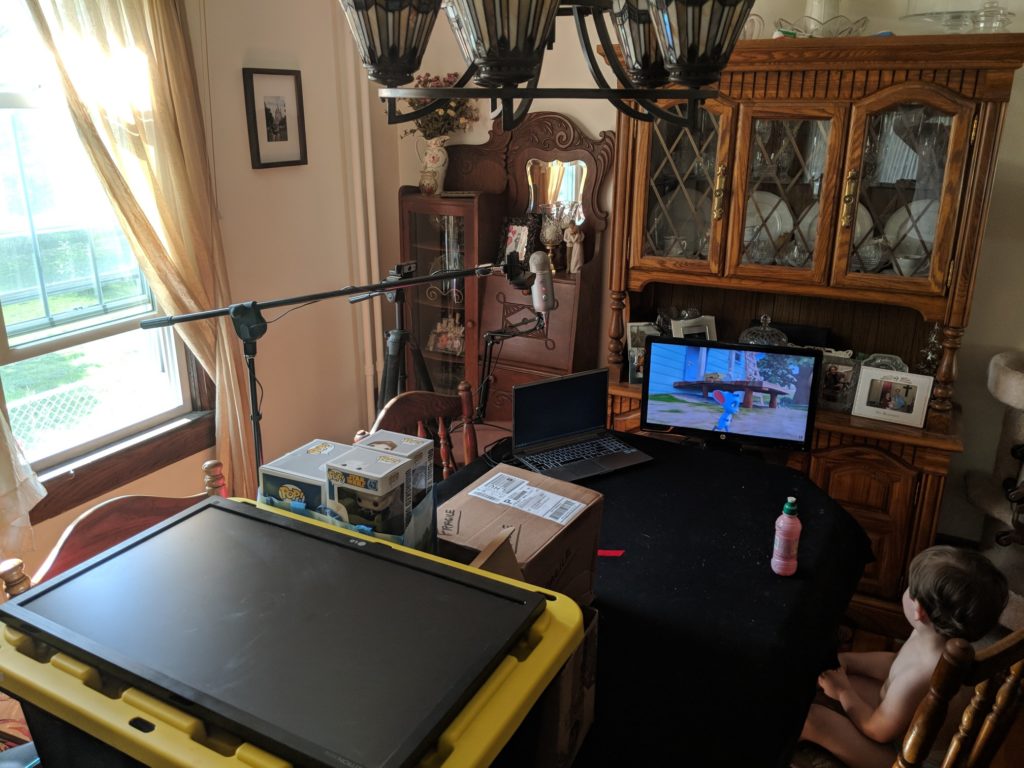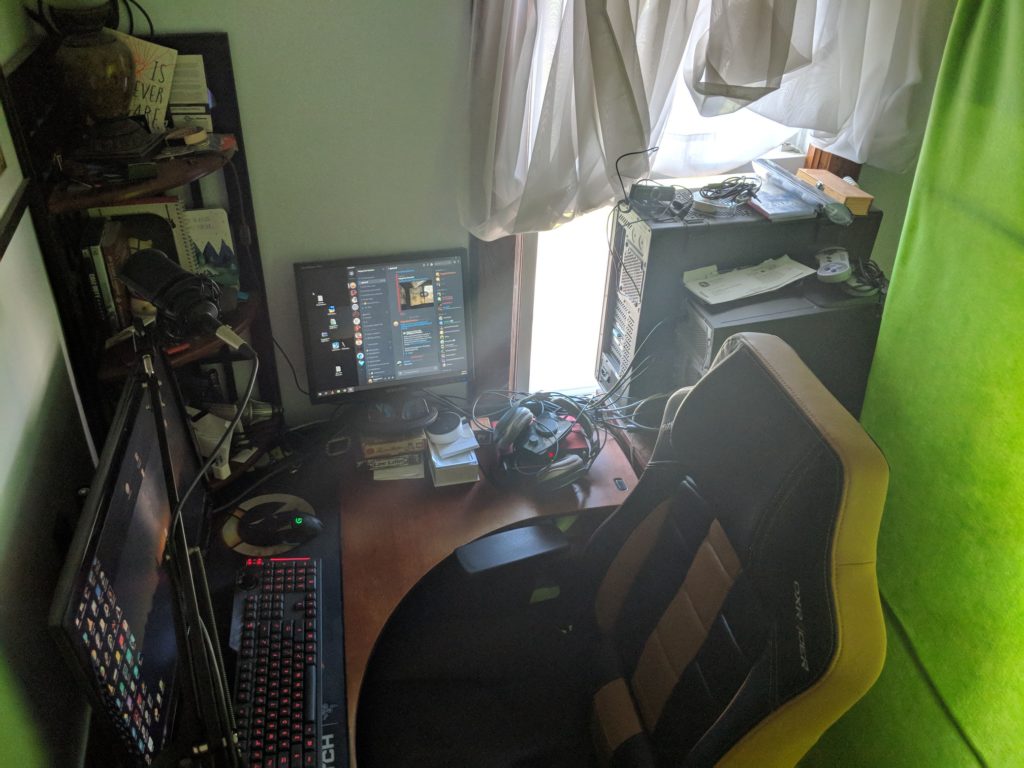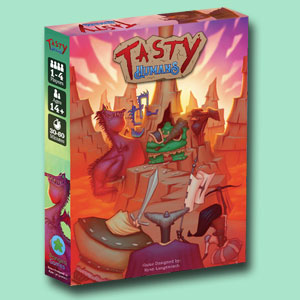In the last few years, live-streaming has skyrocketed in popularity. Through live-streaming, we can share videos of ourselves and our screens with a greater audience, who can communicate with us through chat. It’s tempting to think that the analog nature of board games would preclude live-streaming, but this is not the case. Live-streaming board games can be done with digital tools such as Tabletop Simulator or video cameras capturing gameplay on the physical tabletop. No matter how you choose to do it, live-streaming can be a great way to build an audience and share your game with the world.

Need help on your board game?
Looking for more resources to help you on your board game design journey?
To help you understand how to put on a great show for your fans, I’ve brought in Will Esgro of Happy Fun Time LIVE. He’s an up-and-coming board game live streamer I’ve worked with in the recent past. He knows how to put on a good show!
We interviewed via Discord direct messages which have been lightly edited for clarity and flow. This interview is broken into six parts:
- Who is Will Esgro?
- Why watch streams?
- Why stream games?
- What are the technical requirements?
- How do you build a community?
- Parting advice
Who is Will Esgro?
Brandon: Thank you so much for agreeing to interview with me for the blog! This is going to be a good one – I hear a lot of questions about live-streaming board games.
To get started, tell me about yourself and Happy Fun Time LIVE.
Will: Thanks for reaching out and for providing an outlet to share my experiences.
I’ve been involved in gaming since the age of six when I got my Nintendo. I’ve always tinkered in technology and I often pour myself into side projects when I get bored. Streaming started as one of these “distraction” projects.
I got involved in Twitch streaming when it was migrating from JustinTV, which was basically a platform where people could stream media over the internet and talk about it while watching. I was using my online handle wesgro2. I’d stream Kerbal Space Program, Day Z, and Mech Warrior Online.
After my wife and I received our amazing son 2 years ago, we made the joint decision that I would stay at home with him. Originally, I worked part-time for about a year during the transition. While this was all happening, I started having friends over often to play board games.
I stumbled into Kickstarter, where I noticed some of the most innovative and exciting games were being launched, and this led me to find content creators on YouTube and Twitch. Everything sort of clicked after that.
Brandon: And you’ve been streaming for roughly a year now?
Will: Under the new Happy Fun Time LIVE brand, yes.
Brandon: For those unfamiliar, this is the Twitch channel where you do play-throughs and interviews with the creators of new games.
(Which is a lot of fun for the creator, I might add.)
Why watch streams?
Brandon: With all this in mind, what is the appeal of streaming board games for the viewers? Why do people watch?
Will: I think our core viewers watch and participate in streams to replicate the experience of playing with a regular gaming group. Not many rural or suburban areas of the US or world have places where you can meet up with fellow gamers and just play. It’s unfortunate, but many local game stores in or around small towns devote their resources and space to Magic and Warhammer players. Board games are often overlooked. I don’t blame them because often those are the only returning customers to their stores.
Others will pop in to check out a game they may have been interested in.
I like to ask people ahead of our streams what they want us to play.
Our best night in terms of views are on the nights where I’m just relaxed and having a good time with the guests and our chat.
Brandon: Vicarious experience is a big part of what makes streams work, though having a community is probably bigger. People can respond to you, and you to them in real time.
Having streamed several games, I have to say that it feels like doing small-town radio. You can really connect with your audience in a way that blogging, video, podcasts, etc. don’t allow you to do.
Why stream games?
Brandon: What is the appeal of streaming board games for the creators?
Will: I think the biggest appeal for me was that we are in a board game boom right now. The pool of content creators is small but growing pretty rapidly. I wanted to get in on the ground floor and ride the wave.
I think each creator has their own reasons and influences. Mine were that I like board games and the opportunity to grow in that area of Twitch streaming is exponential as opposed to mainstream gaming which is already gobbled up by too many mainstream streamers.
I’m also planning on streaming some figure painting as I learn the process.
Brandon: For you, it gives you a chance to see new games before they’re out.
For game developers, I’ve noticed that streams are a really good way to spread the word about games. This is especially true since they’re often recorded and saved online for later viewings.
If you’ve got a live Kickstarter campaign and a compelling game, it’s not hard to pull viewers from the stream to your campaign either. I did that with War Co. and made thousands of dollars that way.
Will: And vice versa, we often get new viewers and sometimes strong community members through partnering with designers to promote their games.
Brandon: That’s true, game makers tend to have their own audiences which in turn make yours bigger for later streams with other creators.
What are the technical requirements?
Brandon: What’s involved in streaming from a technical perspective?
Will: I use Streamlabs OBS. It’s free, robust software that is only limited by your imagination when streaming. I just started using a new bot called GatherBot which interacts with viewers while we stream. There is a quest mode that lets people in chat take on different quests in chat to earn rewards. I’ve been loving it.
Hardware is the tough part. We use between 2 and 3 webcams for our live board game play, which is a challenge since I have to take it all down and set it all up each week.
Monday and Wednesday stream setups are easy because I just play video games or invite community members to play Tabletop Simulator or Tabletopia games with me.

Will: That is the Friday table.

Will: And that’s for Mondays and Wednesdays.
Brandon: Would you say you need a special computer to run streams, or can you work with a simple office desktop (or even laptop)?
Will: For board games, you’ll need a decent processor, RAM, and graphics.
Technically, you could get away with using a cell phone, but it may fall flat due to lack of scene changes and no great way to show the board and players at the same time.
I suggest at least an i5 processor, 16 GB of RAM, and a 900 series Nvidia graphic card or equal AMD tech level hardware.
Brandon: The bravest among us may even wish to make their own PCs using parts they get from Amazon.
Will: I’ve been building my PCs for the last 15 years. 🙂
Brandon: Using sites like PC Part Picker and YouTube tutorials as guides. Helps you make a really great computer for a much lower price. I use a home-assembled PC for Pangea Games too. Five hundred bucks in parts and still lightning fast after three years.
Will: Yep.
Will: I still mainly use NewEgg and TigerDirect.
How do you build a community?
Brandon: Once you have all the supplies, how does streaming work socially? How do you engage viewers and maintain a community?
Will: It all starts with your offline friends. Ask them if they want to be a part of it and ask them for feedback. If they don’t enjoy watching you or supporting you, that’s your first sign that something isn’t working.
Start various social media accounts to promote when you stream, then start following and engaging members of the community you would like to grow in.
I suggest Twitter as a primary way to reach out and Reddit as a secondary one. Those seem to have the most traction in cultivating an effective and engaging community.
You also have to commit to at least 10 to 20 hours of watching other content creators and genuinely supporting them. Parallel growth with other streamers is a large part of the initial process.
Start running giveaways. I take about half of what I generate monthly and apply it to prize support for our viewers and subscribers.
I run a monthly giveaway of $40 – 50 in value. Then I run smaller giveaways each time we hit $50 worth of bits on our channel. The monthly is run through Gleam.io which is a great tool for growing each of your social media accounts and media channels symmetrically.
Brandon: That first part is important but easy to miss: make sure you’re able to engage your friends first. Then social media, giveaways, getting involved in the community, and finding peers are all really good ideas.
Will: I now have about 500 followers on each account and our channel.
The really crappy part of streaming is casting.
Brandon: Casting?
Will: Some people are not great in front of a camera. That includes friends and community members.
Brandon: That’s true. Some folks just aren’t telegenic – through no fault of their own.
Will: You have to be ready to have serious conversations with people as you grow regarding how they fit.
This is very challenging and it could temporarily stifle your growth if they don’t take it well.
You also have to develop a sense of who will be right for each game you choose to play on stream.
If you have a goofy friend who is always cracking a joke, they might not be as great for a very involved 4x or Euro game.
They may distract too much from the gameplay and ruin the experience and frustrate you while you’re live.
Will: Same goes for someone who pays lighthearted games too seriously. It takes away from the experience.
The funny thing is I think we all have that friend who shows up for some game nights that we wish we could politely ask not to join in the future when playing a certain game. Like when Grandma used to always flip the table during Monopoly.
I actually have to have those conversations though, and it sucks.
Brandon: Flipping the table after the first turn of Monopoly is a house rule where I live.
It’s true, though, you often have to have uncomfortable conversations with people when doing public-facing entertainment. That’s never easy.
It is, after all, a light version of show business.
Parting advice
Brandon: Okay, one last question.
If there were one piece of advice which you could give yourself before you started streaming, what would it be?
Will: That is a tough one. Streaming is a long experiment until you “make it”. I don’t think I’m at that level yet. Once I’m there, I think I could better reflect and let you know what I did to get there, and what formula clicked.
For now, I’m just happy to have a core group of about a dozen viewers who hang out each night I stream.
Brandon: That’s a good attitude to have. Building an audience from scratch is a long, slow process that gets easier only after a lot of time.
That’s all I’ve got. Thank you very much!
Live-streaming board games is becoming more popular as time goes on. It’s a great way to share your games and engage your community. Have you ever streamed a game? Would you like to? Let us know in the comments below 🙂
August 2020 Update
Because of the coronavirus pandemic of 2020, a lot of people cannot go to conventions, local game stores, or even their friends’ houses to play board games. Love of gaming can’t be quashed by a virus, though. If you want to watch some live-streaming board gamers, the top 10 most popular shows at the time this update is being published are:
- FFGLive
- Shut Up & Sit Down
- BoardGameGeekTV
- AnalisisParalisis
- GoldSquadronPodcast
- TheBrothersMurph
- BigPotatoGamesTV
- LederGamesMedia
- VttvLive
- Deagal_Remyr





One thought on “How to Live-Stream Board Games”
Due to the pandemic I’m currently trying to find a way to make our rainbow Quest board game accessible via Zoom or some other streaming platform. As the game involves some elements of charades and pictionary, we’re not yet sure how this is going to translate to an online experience.